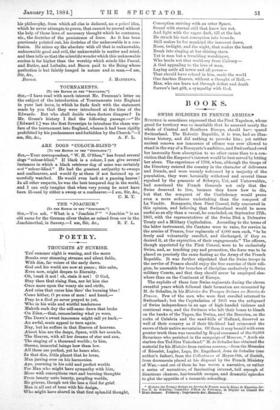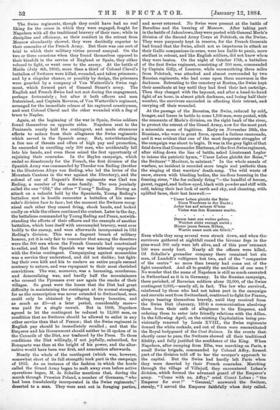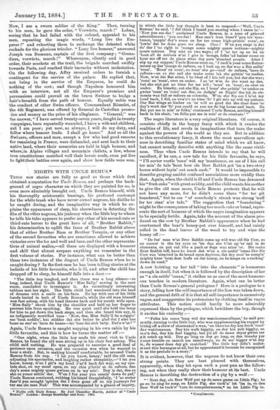BOOKS.
SWISS SOLDIERS IN FRENCH ARMIES.*
Suaraisz is sometimes expressed that the First Napoleon, whose greed for territory was so insatiable that he annexed nearly the whole of Central and Southern Europe, should haws spared Switzerland. The Helvetic Republic, it is true, had an illus- trious history, and did nothing to provoke him ; yet neither ancient renown nor innocence of offence was ever allowed to stand in the way of a Bonaparte's ambition, and Switzerland owed her immunity from absorption to no other cause than to a con- viction that the Emperor's interest would be best served by letting her- alone. The experience of 1798, when, although the troops of the Directory entered the country in the character of deliverers and friends, and were warmly welcomed by a majority of the population, they were, heroically withstood and several times repulsed by the peasants of Schwytz, Uri, and Unterwalden, • had convinced the French Generals not only that the Swiss deserved to live, because they knew how to die, but that the conquest of the Confederacy would prove even a more arduous undertaking than the conquest of La Vendee. Bonaparte, then First Consul, hilly concurred in this opinion, and believing that Switzerland would be more useful as an ally than a vassal, he concluded, on September 27th, 1803, with the representatives of the Swiss Diet a Defensive Treaty and a Military Capitulation. According to the terms of the latter instrument, the Cantons were to raise, for service in. the armies of France, four regiments of 4,000 men each, "to be freely and voluntarily enrolled, and discharged, if they so desired it, at the expiration of their engagements." The officers, though appointed by the First Consul, were to be exclusively Swiss, and, as touching pay and promotion, the force was to be placed on precisely the same footing as the Army of the French Republic. It was further stipulated that the Swiss troops in the service of France should enjoy the free exercise of their reli- gion, be amenable for breaches of discipline exclusively to Swiss military Courts, and that .they should never be employed else- where than on the Continent of Europe.
The exploits of these four Swiss regiments during the eleven eventful years which followed their formation are recounted by M. di Schaller, in his Histoire des Troupes Suissee au Service de Prance. Few of the men who were first enrolled returned to Switzerland; but the Capitulation of 1803 was the safeguard of Swiss independence in an age of high-handed violence and continual wars, and the Switzers who left their bones to bleach on the banks of the Tagus, the Dwina, and the Beresina, on the rocks of Calabria and the sand-hills of 'Holland, deserved as well of their country as if their life-blood bad crimsoned the snows of their native mountains. Of them it may be said with even greater truth than was recorded by Royal command of the 30,000 Bavarians who perished in the campaign of Moscow, " Auch sie starben den Tod ffirs Vaterland." M. de Schaller has obtained the material for his Histoire from various sources,—from the Memoirs of Rosselet, Legler, Lego, Dr. Engelhard, Jean de Schaller (our author's father), from the Coliectanea of Meyer-Ott, of Zurich, from documents placed at his disposal by the. French Ministry of War,—and out of them he has woven a narrative, or rather a series of narratives, of fascinating interest, full enough of disastrous chances, hairbreadth escapes, and dramatic'episodes to glut the appetite of a romantic schoolboy.
Histoire des Troupes Buisses an Service de France 50114 le None de Napoleon /er- Par H. de Schaller, Conseiller d'Etat de Fribourg, et Deput6 as Commit des Etats Seisms. Fribourg : Iinprimerie Ant. Henseler,
The Swiss regiments, though they could have had no real liking for the cause in which they were engaged, fought for Napoleon with all the traditional bravery of their race; while in
discipline and efficiency, as their conduct in the retreat from Moscow abundantly showed, they were decidedly superior to
their comrades of the French Army. But there was one sort of trial to which their military virtue proved unequal. On the two or three occasions when they found themselves opposed to their kinsfolk in the service of England or Spain, they either refused to fight, or went over to the enemy. At the battle of Maids (July 4th, 1806), more than a third of Colonel Chivas battalion of Switzers were killed, wounded, and taken prisoners ; and by a singular chance, or possibly by design, the prisoners were guarded by a company of Von Watteville's Swiss regi- ment, which formed part of General Stuart's army. The English and French Swiss had not met during the engagement, perhaps fortunately ; but after it both officers and men fraternised, and Captain Roverea, of Von Watteville's regiment, arranged for the immediate release of his captured countrymen, and sent Colonel Clavel and the other wounded with a flag of truce to Naples.
Again, at the beginning of the war in Spain, Swiss soldiers found themselves on opposite sides. Napoleon sent to the Peninsula nearly half the contingent, and made strenuous efforts to seduce from their allegiance the Swiss regiments which served in the Spanish army. But, notwithstanding a free use of threats and offers of high pay and promotion, he succeeded in enrolling only 300 men, who accidentally fell into his hands, and even these seized the first opportunity of rejoining their comrades. In the Baylen campaign, which ended so disastrously for the French, the first division of the Spanish Army was commanded by Theodor von Reding (brother to the illustrious Aloys von Reding, who led the levies of the Mountain Cantons in the war against the Directory), and the colonel of one of Dapont's Swiss regiments was Carl von Reding, a member of the same family. The men jocularly called the one "Old," the other "Young" Reding. Daring an attack on a redoubt held by the Spaniards, Young Reding's battalion met in hostile encounter a battalion of his name- sake's division face to face ; but the moment the Switzers recog- nised each other they ceased firing, shook hands, and looked coolly on while the others continued the contest. Later in the day, the battalions commanded by Young Reding and Preux, notwith- standing the efforts of their officers and the example of another battalion, which bore itself with unexampled bravery, went over bodily to the enemy, and were afterwards incorporated in Old Reding's division. This was a flagrant breach of military honour, yet it is only fair to remember that among the deserters were the 300 men whom the French Generals had constrained to enlist, and that the Spanish war was intensely unpopular with the Swiss contingent. Campaigning against monarchies was a service they understood, and did not dislike ; but fight- ing their own kith and kin to enslave an entire people seemed contrary to nature, and was repugnant to their most cherished convictions. The war, moreover, was a harassing, murderous, and demoralising war, and hardly half the mountaineers who crossed the Pyrenees ever saw again the smoke of their villages. So great were the losses that the Diet had great difficulty in maintaining the contingent at its normal strength, for as the conscription was never extended to Switzerland, men could only be obtained by offering heavy bounties, and as much as £5—at a later period, considerably more— was paid for a single recruit. But in 1808, Napoleon agreed to let the contingent be reduced to 12,000 men, on condition that no Switzers should be allowed to enlist in any other service than that of France ; that the Swiss regiment in English pay should be immediately recalled ; and that the Emperor and his Government should neither be ill Spoken of in the Councils of the Diet, nor traduced by the Press. To these conditions the Diet willingly, if not joyfully, subscribed, for Bonaparte was then at the height of his power, and the alter- native would have been war first, and annexation afterwards.
Nearly the whole of the contingent (which was, however, somewhat short of its fall strength) took part in the campaign of 1812. As an instance of the fashion in which the horde called the Grand Army began to melt away even before active operations began, M. de Schaller mentions that, during the march through Prussian Poland, a number of Germans, " who had been fraudulently incorporated in the Swiss regiments," deserted to a man. They were sent out in foraging parties,
and never returned. No Swiss were present at the battle of Borodino and the burning of Moscow. After taking part in the battle of Jakonbowo, they were posted with General Merle's division of the Second Army Corps at Polotosk, on the D wine- They were purposely kept in reserve, for the French Generals had found that the Swiss, albeit not so impetuous in attack as
their Gallic companions-in-arms, were less liable to panic, more stedfast in retreat, and like English soldiers, did not know whew they were beaten. On the night of October 17th, a battalion of the first Swiss regiment, consisting of 300 men, commanded by Captain Gilly, of Lucerne, while reconnoitring three miles from Polotosk, was attacked and almost surrounded by two- Russian regiments, who had come upon them unawares in the
Retreating to the cemetery at Rostna, the Swiss kept their assailants at bay until they had fired their last cartridge.. Then they charged with the bayonet, and after a hand-to-hand fight of an hour, in almost pitch darkness, and losing half their- number, the survivors succeeded in effecting their retreat, and carrying off their wounded.
At the passage of the Beresina, the Swiss, reduced by cold,. hunger, and losses in battle to some 1,100 men, were posted, with the remnants of Merle's division, on the right bank of the river,. to protect the retreat of the Grand Army, now for the most part a miserable mass of fugitives. Early on November 28th, the- Russians, who were in great force, opened a furious cannonade, and it was evident that one of the most desperate struggles of the campaign was about to begin. It was in the grey light of that fatal dawn that Commander Blattman, of the first Swiss regiment,.
after riding down the line of battle, asked Lieutenant Legler to intone the patriotic hymn, "Unser Leben gleicht der Reise," the Switzers' " Morituri, to salutant." In the whole annals of warfare, no incident is recorded more tragic and pathetic than the singing of that warriors' death-song. The wild waste of snow, strewn with bleeding bodies, the ice-floes booming in the- freezing river, "the foe sullenly firing "—the handful of heroes,. gaunt, ragged, and hollow-eyed, black with powder and stiff with cold, taking their last look of earth and sky, and chanting, with uplifted faces, their last farewell :—
"17nser Leben gleicht der Reise Eines Wandrers in der Nacht ; J oder hat auf seinem Gleise Vieles was ihm Kummer macht.
Darum host uns weiter goben, Weichet nicht verzagt =Irak ; Hinter jenen fernen Hehen, Wartet nnser nosh ern Gluck."
Even while they sang several were struck down, and when the survivors gathered at nightfall round the bivouac fires in the-
pine-wood 300 only were left alive, and of this poor remnant.
100 were sorely hurt. Nearly all the officers were killed.. Of Schaller's grenadier company there remained but six men, of Landolt's voltigenrs but two, and of the " companies of the centre " no more than twenty had come out of the fight unscathed. And all to gratify the ambition of one man No wonder that the name of Napoleon is still as mach execrated in Switzerland as it is in Germany. In the Russian campaign, there perished, of Bavarian soldiers alone 32,000, of the Swiss
contingent 9,000,—nearly all, in fact. The few who survived,. reinforced by those who had not taken part in the campaign and recruits sent from Switzerland, continued to fight for France, always bearing themselves bravely, until they received from the Swiss Diet (January, 1814) a communication absolving- them from their oath of allegiance to the Emperor, and ordering them to enter into friendly relations with the Allies.. In the following April, on the existing Capitulation being pro- visionally renewed by Louis XVIII., the Swiss regiments donned the white cockade, and out of them were reconstituted the Royal bodyguard of the Cent Suisses. In the events that shortly came to pass, the Switzers showed all their traditional fidelity, and fully justified the confidence of the King. When Napoleon, after escaping from Elba, was marching on Paris, a small Swiss brigade, commanded by Colonel Affry, formed. part of the division told off to bar the usurper's approach to the capital. But the Swiss had hardly left Paris when they were deserted by their French comrades. Marching through the village of Villejuif, they encountered Loban's division, which formed the advanced guard of the Emperor's army. " Come with us, Affry," cried Count Loban ; " the Emperor for ever !" " General," answered the Switzer,.
sternly, " I served the Emperor faithfully when duty called..
Now, I am a sworn soldier of the King." Then, turning to his men, he gave the order, " Vorwiirts, march !" Lobau seeing that he had failed with the colonel, appealed to his men, repeating the magic words, "Long live the Em- peror !" and exhorting them to exchange the detested white cockade for the glorious tricolor. "Long live honour," answered Joseph von Bumaun, captain of the first company ; "Grena- diers, vorwarts, march !" Whereupon, silently and in good order, their muskets at the trail, the brigade marched swiftly towards Paris, and reached their barracks without molestation. 'On the following day, Affry received orders to furnish a -contingent for the service of the palace. He replied that, not being in the service of the Emperor, he could do nothing of the sort ; and though Napoleon honoured him with an interview, not all the Emperor's promises and -persuasions could prevail on the brave Switzer to budge a hair's-breadth from the path of honour. Equally noble was the conduct of other Swiss officers. Commandant Rosselet, of the 4th Regiment, was offered by General de Castellon promo- `ion and money as the price of his allegiance. " General," was tie answer, " I have served twenty-seven years, fought in twenty umpaigns, been repeatedly wounded, I have a wife and children, and I am poor ; yet now, as always, I will do my duty, and follnw where honour leads. I shall go home." And so all the Swi\zers, officers and men, except a few who had good reasons for rsmaining in France, were disbanded, and sent back to their nativs land, where their memories are held in high honour, and wherein Alpine villages and mountain chttlets, a few, whose iron constitutions matehed well their heroic souls, even yet live to fighttheir battles over again, and show how fields were won.








































 Previous page
Previous page